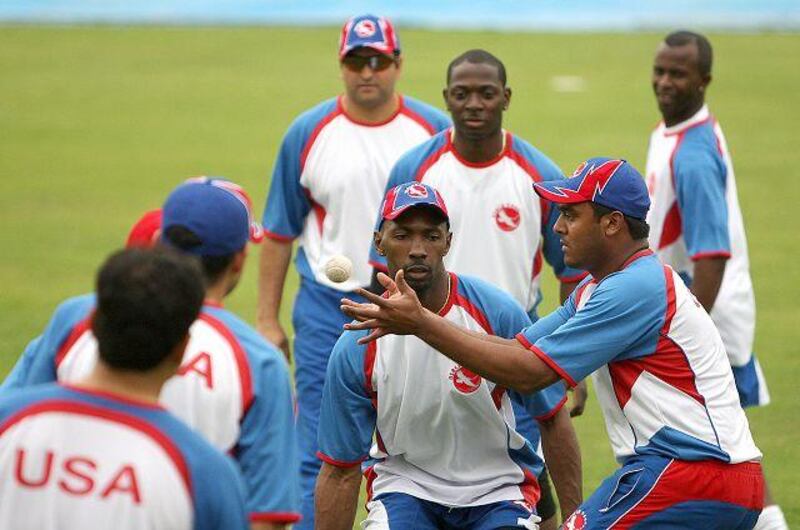SHARJAH // Afghanistan's national cricketers were deprived of the chance to scout their US opponents from across the playing field yesterday, as a delayed flight from Colombo, Sri Lanka, meant they missed a scheduled 10am training session.
Some might have perceived it as a blessing in disguise. Rarely can a match of the "Gentleman's Game" carry as much political intrigue as Afghanistan's meeting, in Dubai on Thursday, with a certain US national team. The cricketers representing the two nations were due to share practice facilities at Sharjah Cricket Stadium, ahead of the forthcoming ICC World Twenty20 Qualifier, to be staged in the UAE from Tuesday.
Some can hardly wait for the action to commence. "Every game is important for us because we are trying to qualify for the World Cup, whether we play against Ireland, Scotland or America," said Hameed Hassan, a fast bowler for Afghanistan. "Lots of people are definitely waiting for the America game. Inshallah, we will win our first two games against Ireland and Scotland, then we will do our best to beat them.
"We have been sent a lot of good wishes from people back at home, who are waiting to see how we do against them. Let's see how we do on Thursday." Whether the group A fixture between the US and Afghanistan will be as incendiary as it might appear on paper is debatable. The US squad is peopled entirely by players of either West Indian or subcontinental backgrounds. Few of the players are particularly motivated by traditional American sport, and fewer still are likely to stay up to watch the Super Bowl tonight.
As if to emphasise the disparate make-up of this side, they are coached by two former Test players from different nations. Dipak Patel, who is of Indian heritage, was brought up in the British Midlands before emigrating to New Zealand, for whom he played international cricket. The Guyanese head coach, Clayton Lambert, became an American citizen in 1991 thanks to sponsorship by his mother, and still played Test cricket for the West Indies after that.
The political significance of a sporting fixture between his adopted nation and Afghanistan does not carry much weight with Lambert. "For us, it is just a game that we want to win because we don't like to lose, not for any other reason," said the burly 47-year-old coach. Indeed, the greatest incentive for the Americans to succeed against the Afghans seems to be that it would upset the odds. The US were only welcomed back into the global cricket fold relatively recently, after being suspended from international competition due to problems at the administrative level.
They were granted a special invitation to play at this week's qualification tournament by the sport's Dubai-based ruling body, the International Cricket Council. The ICC believes that there is a dormant market for the sport ready to be tapped in the US, with Twenty20 - an abridged version of the game which takes just three hours, as opposed to five days - seen as the ideal vehicle to attract new fans.
Afghanistan, meanwhile, have blazed a trail through international cricket in recent years. They are now regarded as one of the best limited-overs sides outside of the Test playing elite. "We know they have very talented players," added Lambert. "It was not long ago that we were in the same division as Afghanistan. "They won, we lost, and they have really progressed now they are part of the [ICC] high performance programme.
"They benefit from living like professional cricketers, but we have some outstanding talent. Pound for pound, we are not afraid of anyone." Later this month, the Afghans will be the nominal "home" side when Sharjah becomes the first venue in world cricket to have staged 200 one-day internationals, in a match against Canada. It is a marker of how far they have come in such a short time. When the emirate played host to its first international match in 1984, cricket was just starting to take root amongst Afghan refugees, who had been displaced to neighbouring Pakistan by the Soviet invasion.
The game was learnt from watching Pakistan matches on television. Sticks and taped tennis balls had to pass for makeshifts bats and cricket balls, and early matches were played on flattened mud pitches. In less than a decade, they earned official one-day international status via a competition in South Africa last year, in which they finished two places ahead of the UAE. Their evolution has been swift in every facet of the game. When they first toured together as an international cricket team in 2001, they celebrated taking wickets with a handshake and uttered "Allah Akbar". Anything more vociferous was banned by their Taliban rulers. Now they have earned a reputation as one of the most excitable and vocal sides on the circuit.
"The match against the USA will be an exciting one, but it will just be another game of cricket in which both sides are trying as hard as possible to emerge the winner," said Nawroz Mangal, the Afghanistan captain. "We respect the USA and know we cannot afford to be complacent against them." pradley@thenational.ae






